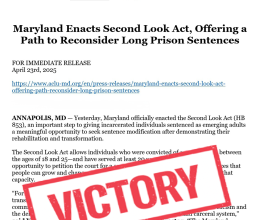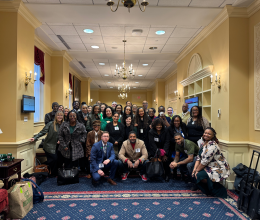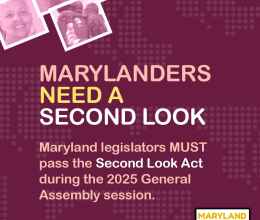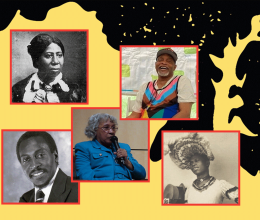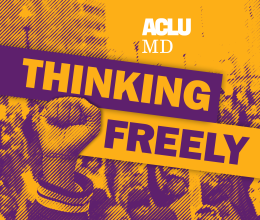
One of the biggest threats to our democracy is rooted in our mass incarceration crisis. Our nation has the highest incarceration rate in the world, and Maryland disgracefully leads the nation with the highest percentage of racial disparities in our prisons. While Black Marylanders only make up 31% of the overall state population, they represent 52% of people in jail and 69% of people in prison.1 There are serious and continuing problems of over-policing in Black neighborhoods and biased sentencing laws. These racist policies have a devasting effect on the political power of Black Americans.
Dating back to the racist Jim Crow era, felony disfranchisement laws were created in the states after the Civil War as an intentional effort to weaken the political power of Black people who had been enslaved. That time was also when the abominable effort began to incarcerate Black people who were newly freed, in part to continue forced, unpaid labor.
Today, long after the Voting Rights Act was passed in 1965, Black leaders are still advocating for the restoration of voting rights so that every citizen can participate in our democracy. At the ACLU of Maryland’s 2019 Constitution Day forum, Nicole Hanson, director of Out for Justice Inc., spoke about her work to restore the voting rights of Marylanders who are incarcerated.
Hanson, her staff, and volunteers went to detention centers and brought ballots to eligible incarcerated people so that they could vote. “We got our incarcerated citizens ballots,” said Hanson. “We brought the ballot back to the institution. And our incarcerated citizens were able to cast their vote. And we were able to serve over 83 incarcerated citizens over the last election.”
While currently people who are incarcerated for felonies in Maryland cannot vote, Marylanders who are jailed before their trial and those who are incarcerated for only misdemeanors still have the right to vote. However, because of misinformation and hurdles in the criminal legal system, many Marylanders who are incarcerated and eligible to vote do not know that they can vote and/or do not have the tools to vote. On average, every month, 6,4002 people are detained in pretrial in Maryland and they largely do not have access to vote – even though they are eligible. That’s a democracy crisis that must be fixed.
Lupé Hawkins is a Marylander who was formerly incarcerated and understands the importance of every citizen’s vote. Hawkins said: “A lot of people that are incarcerated will be coming home. It’s just as important for them to vote as a person who hasn’t been incarcerated. It’s our community.”
We cannot allow any excuses from the Maryland State Board of Elections that try to justify the denial of voting rights to thousands of eligible Maryland voters who are incarcerated. They still have the right to a say in decisions that affect their families and communities. The State must also take seriously voter education to those who are incarcerated but still have their right to vote, because confusion about these laws has kept countless Marylanders from voting.
Yanet Amanuel, public policy advocate with ACLU, said: “There’s a lot of misinformation out there. We were outside parole and probations offices, registering people to vote. And we found that a lot of individuals simply did not know they could vote. It’s not that they didn’t have the interest. It’s that they simply didn’t know that they had the ballot. And it wasn’t just them that didn’t know. It was their family members, parole probation officers themselves, and poll workers who were misinformed.”
This legislative session, the ACLU and our partners will be pushing for a statewide policy in the General Assembly that will allow all eligible Maryland voters, regardless of whether they are incarcerated, meaningful access to the ballot. The bill would ensure these Marylanders have the tools necessary to vote, such as voter registration and absentee ballot applications, and information about how to exercise their voting rights.
“Voting makes you feel human,” said Lupé Hawkins. “Voting can change what’s going on in the community around you.”
Expanding the ballot to eligible voters who are incarcerated – disproportionately Black and Brown people – is a critical step toward restoring our democracy. Let’s get it done.
1Incarceration Trends in Maryland. Vera Institute of Justice, www.vera.org/downloads/pdfdownloads/state-incarceration-trends-maryland.pdf.
2Justice Reinvestment Advisory Board. http://goccp.maryland.gov/wp-content/uploads/JRA-Advisory-Board-Minutes-201906.pdf.
